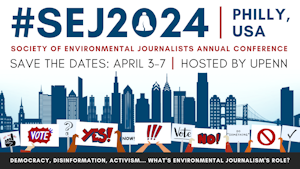SEJournal Online is the digital news magazine of the Society of Environmental Journalists. Learn more about SEJournal Online, including submission, subscription and advertising information.
After proposing a directive that seemed to require permits and fees for journalists working in U.S. Forest Service wilderness lands, the USFS faced negative reaction from news media groups and both parties in Congress. On September 25, 2014, USFS said that it had never intended the restrictions to apply to journalists. Tim Wheeler, chairman of the Society of Environmental Journalists' Freedom of Information Task Force, talked on the phone September 26 with USFS Chief TomTidwell, seeking to clarify the USFS position.
Here is Wheeler's report on that conversation, originally posted to the SEJ-TALK listserve, and used here with permission.
Dear SEJ Community:
I had a phone conversation with US Forest Service Chief Tom Tidwell today. He called to reinforce his written statement issued late Thursday that the service’s proposed directive on commercial filming in wilderness areas is not aimed at restricting news-gathering of any sort, breaking or otherwise.
“First, I want to be as clear as I can possibly be that this does not infringe on anyone’s First Amendment rights,” he said.
While he reiterated his prior statement that the proposed directive “does not apply” to news-gathering, he acknowledged when I pressed him that the written language does not actually say that. He said he wants to leave journalists, photographers and video crews free from having to get permits or pay fees to go into wilderness areas after a story, any story, not just breaking news. And later in the chat, he said he even believed that documentary films ought to be exempt, which I think is a significant change from the proposal and current practice of lumping those in with Hollywood productions.
Tidwell explained the motivation behind the proposed directive came from the inconsistent handling by various wilderness managers of filming and photography – something Craig Welch documented very well today in a piece in the Seattle Times.
Tidwell said he wants to standardize treatment of filming nationwide and limit permits and fees chiefly to those truly “commercial activities that have the potential for impacting the wilderness or for affecting the public’s use and enjoyment of it.” He mentioned a car commercial as one example of something that would have to be regulated, if not pushed out of the wilderness altogether. And he said he didn’t think photography of any sort, commercial or otherwise, ought to be required to get a permit. The only exception might be, he said, if similar to filming it involved using props (per direction from Congress) or a large number of people or equipment.
Tidwell said he wanted feedback from SEJ and other journalism groups on how to improve the wording. So in coming weeks, we intend to draw up model language for submittal, and hope to get support for it from as broad a coalition as possible. We’ve already been in touch with some J-groups and plan to reach out to more. If you have ideas for how to wordsmith it or real-world examples to pose to help clarify the policy, please post them here or send them directly to me. And of course, If you want to contact the USFS directly to comment on this, by all means do so. I believe the brass in DC was truly floored by the vehemence of the reaction, and they’re scrambling now to put out the fire. We may stop scorching them, but we want to keep the heat on.
Thanks to everyone for spreading the word and sharing concerns and experiences.
Tim Wheeler
Reporter, The Baltimore Sun
Chair, SEJ First Amendment Task Force
SOME FURTHER LINKS:
















